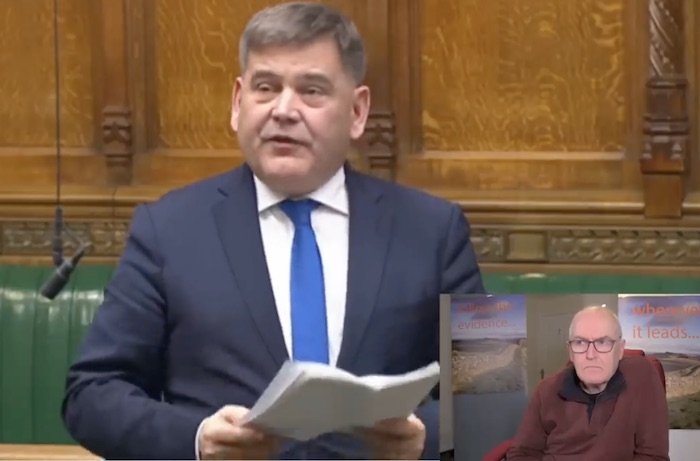COVID-19
British MP calls for end of emergency use authorization for COVID-19 vaccines

According to the federal government over 83% of Canadians have taken a single COVID-19 vaccine and 80% of Canadians are considered fully vaccinated.
But somewhere between the initial vaccinations and the ongoing schedule of booster shots, Canadians have thoroughly disengaged. Despite ongoing advertisements and reminders from provincial and federal governments, fewer than 20% of Canadians have taken booster shots in the last 6 months.
Clearly, Canadians are deciding on their own that the effects of COVID-19 are not worth whatever small risk of adverse reaction might occur from the vaccines.
Results of a recent study “Serious adverse events of special interest following mRNA vaccination in randomized trials” show Canadians may very well be correct to hesitate.
This week in UK Parliament MP Andrew Bridgen called for Parliament to revoke Emergency Use Authorization.
Denmark does NOT recommend the covid vax to under 50s.
Yet when Andrew Bridgen MP clearly laid out concerns in the UK parliament it was dismissed as 'conspiracy theory'.
Corruption & ignorance is rife & endangering lives. pic.twitter.com/DunHNyrPCx
— Lange (@djlange) December 15, 2022
'We are dealing with something that is truly very disturbing and is continuing to cause harm to people.' @DrAseemMalhotra tells @MrMarkDolan that Andrew Bridgen's speech will 'go down in history' after the MP called on the government to halt Covid vaccines. pic.twitter.com/hn5nT7VtJ3
— GB News (@GBNEWS) December 15, 2022
Dr Peter Doshi senior editor of the BMJ wants to know why we haven't already #StoptheShots when 1 in 800 are seriously harmed, yet previous vaccines were suspended for harming 'only' 1 in 100'000.
Beats me too! pic.twitter.com/llT4JwL5WQ— Porridge2022 (@porridge2022) December 16, 2022
COVID-19
Randy Hillier wins appeal in Charter challenge to Covid lockdowns

Former Ontario Member of Provincial Parliament Randy Hillier in the Ontario Legislature (Photo credit: The Canadian Press/Chris Young)
The Justice Centre for Constitutional Freedoms is pleased that the Ontario Court of Appeal has accepted former Ontario MPP Randy Hillier’s appeal and overturned a lower court ruling that had dismissed his Charter challenge to Ontario’s lockdown regulations. These regulations were in effect during the 2021 Covid lockdowns.
The decision was released by the Ontario Court of Appeal on Monday, April 7, 2025.
In the spring of 2021, Mr. Hillier attended peaceful protests in Kemptville and Cornwall, Ontario. He spoke about the importance of the Canadian Charter of Rights and Freedoms and the harms caused by the province’s lockdown regulations. The government’s health orders made it illegal for even two people to assemble together outdoors: a blatant and unjustified restriction of the Charter section 2(c) freedom of peaceful assembly. Other provinces allowed five or ten or more people to gather together outdoors.
Mr. Hillier has outstanding charges in Kemptville, Cornwall, Peterborough, Belleville, and Smith Falls. Prosecutors in those jurisdictions are waiting to see the results of this Charter challenge. Mr. Hillier has faced similar charges in many other jurisdictions across Ontario, but these have been stayed or withdrawn at the request of the respective prosecutors.
Mr. Hillier defended himself against the tickets that were issued to him for violating lockdown restrictions by arguing that these lockdown regulations were unjustified violations of Charter section 2(c), which protects freedom of peaceful assembly.
Four expert reports were filed to support Mr. Hillier’s case, including the report of Dr. Kevin Bardosh, which extensively reviewed the many ways in which lockdowns harmed Canadians. They showed alarming mental health deterioration during the pandemic among Canadians, including psychological distress, insomnia, depression, fatigue, suicidal ideation, self-harm, anxiety disorders and deteriorating life satisfaction, caused in no small part by prolonged lockdowns. Many peer-reviewed studies show that mental health continued to decline in 2021 compared to 2020. The expert report also provides abundant data about other lockdown harms, including drug overdoses, a rise in obesity, unemployment, and the destruction of small businesses, which were prevented from competing with big-box stores.
Justice Joseph Callaghan dismissed that challenge in a ruling issued November 22, 2023. Notably, Justice Callaghan did not reference any evidence of lockdown harms that Dr. Bardosh had provided to the court. Without reasons, the court declared that Dr. Bardosh is “not a public health expert” and then ignored the abundant evidence of lockdown harms.
Lawyers for Mr. Hillier filed a Notice of Appeal with the Ontario Court of Appeal on December 22, 2023.
Mr. Hillier’s Appeal argued that, among other things, Justice Callaghan erred in applying the Oakes test. As the Notice of Appeal states, Justice Callaghan “fail[ed] to recognize that a complete ban on Charter protected activity is subject to a more onerous test for demonstrable justification at the minimal impairment and proportionality branches of Oakes.”
The Oakes test was developed by the Supreme Court of Canada in the 1986 case R. v. Oakes, as a way to evaluate if an infringement of a Charter right can be demonstrably justified in a free and democratic society. That test has three parts. The first requires that the means be rationally connected to the objective. The second is that it should cause minimal impairment to the right. The third is proportionality, in the sense that the objective of impairing the right must be sufficiently important.
Mr. Hillier’s Appeal focused on the second part of the Oakes test: whether the regulations were minimally impairing of Mr. Hillier’s 2(c) freedom where they effectively banned all peaceful protest.
Justice Centre President John Carpay stated, “It is refreshing to see a court do its job of protecting our Charter freedoms, by holding government to a high standard. There was no science behind Ontario’s total ban on all outdoor protests.”
COVID-19
Massive new study links COVID jabs to higher risk of myocarditis, stroke, artery disease

From LifeSiteNews
A new meta-analysis covering 85 million people found more evidence linking the COVID-19 vaccines to stroke, coronary artery disease, myocardial infarction, and arrhythmia.
A new meta-analysis covering 85 million people has found more evidence linking the COVID-19 vaccines to serious medical harms, although the authors appear to downplay the significance of their own findings in what one analyst calls the price of publication.
The study, published in the International Journal of Preventive Medicine, analyzes the findings of 15 previous studies covering almost 46 million vaccinated individuals and 40 unvaccinated ones. The effects overwhelmingly concern the Pfizer and AstraZeneca shots.
“Bayesian meta-analysis revealed a link between vaccines and CAD risk (OR, 1.70; 95% CrI: 1.11-2.57), particularly after BNT162b2 (OR, 1.64; 95% CrI: 1.06-2.55) and second dose (OR, 3.44; 95% CrI: 1.99-5.98),” the paper summarizes. “No increased risk of heart attack, arrhythmia, or stroke was observed post-COVID-19 vaccination. As the only noteworthy point, a protective effect on stroke (OR, 0.19; 95% CrI: 0.10-0.39) and myocardial infarction (OR, 0.003; 95% CrI: 0.001-0.006) was observed after the third dose of the vaccine.”
However, digging into the study’s actual data reveals a 70% increased overall risk of coronary artery disease (CAD); a 286% increased risk of myocardial infarction (MI) after second doses; a 240% increased risk of stroke after a first dose; and a 199% increased risk of arrhythmia after a first dose.
The authors conclude that the “association of COVID-19 vaccination with the risk of coronary artery disease should be considered in future vaccine technologies for the next pandemic,” but curiously argue that “(w)hile acknowledging potential side effects, our findings support the overall safety of the COVID-19 vaccine concerning cardiovascular complications such as myocardial infarction, stroke, and arrhythmia.”
Commenting on the study, McCullough Foundation epidemiologist Nicolas Hulscher argued that the discrepancy between the “actual data” and “how the authors spin it for publication” was to be expected, as “most will say anything to get the paper published” given the pervading biases among the medical establishment.
The data adds to a significant body of evidence behind ambivalence to the COVID-19 vaccines.
The federal Vaccine Adverse Event Reporting System (VAERS) reports 38,541 deaths, 220,494 hospitalizations, 22,247 heart attacks, and 28,908 myocarditis and pericarditis cases as of March 28, among other ailments. U.S. Centers for Disease Control & Prevention (CDC) researchers have recognized a “high verification rate of reports of myocarditis to VAERS after mRNA-based COVID-19 vaccination,” leading to the conclusion that “under-reporting is more likely” than over-reporting.
An analysis of 99 million people across eight countries published in the journal Vaccine “observed significantly higher risks of myocarditis following the first, second and third doses” of mRNA-based COVID vaccines, as well as signs of increased risk of “pericarditis, Guillain-Barré syndrome, and cerebral venous sinus thrombosis,” and other “potential safety signals that require further investigation.” In April 2024, the CDC was forced to release by court order 780,000 previously undisclosed reports of serious adverse reactions, and a study out of Japan found “statistically significant increases” in cancer deaths after third doses of mRNA-based COVID-19 vaccines, and offered several theories for a causal link.
In January, a long-awaited Florida grand jury report on the COVID vaccine manufacturers found that while only a miniscule percentage of the millions of vaccinations resulted in serious harm based on the data it had access to, such events do occur, and there are “profound and serious issues” in pharmaceutical companies’ review process, including reluctance to share what evidence of adverse events they did find.
All eyes are currently on President Donald Trump and his health team, helmed by Robert F. Kennedy Jr. as Secretary of Health and Human Services. As one of the country’s most vocal critics of the COVID establishment and vaccines more generally, his nomination brought hope that the second Trump administration will take a critical reassessment of the shots that the returning president has previously embraced, although most of Kennedy’s comments since joining Trump have focused on other issues, such as conventional vaccines and harmful food additives, and during confirmation hearings he called Operation Warp Speed an “extraordinary accomplishment.”
Trump has given mixed signals as to the prospects of reconsidering the shots and has nominated both critics and defenders of establishment COVID measures for a number of administration roles.
-

 Alberta2 days ago
Alberta2 days agoMedical regulator stops short of revoking license of Alberta doctor skeptic of COVID vaccine
-

 MacDonald Laurier Institute2 days ago
MacDonald Laurier Institute2 days agoRushing to death in Canada’s MAiD regime
-

 Bruce Dowbiggin2 days ago
Bruce Dowbiggin2 days agoBettman Gives Rogers Keys To The Empire. Nothing Will Change
-

 2025 Federal Election2 days ago
2025 Federal Election2 days agoPoilievre Will Bring in ‘One and Done’ Resource Approvals, and Ten Specific Projects Including LNG Canada Phase II
-

 conflict1 day ago
conflict1 day agoZelensky Alleges Chinese Nationals Fighting for Russia, Calls for Global Response
-

 2025 Federal Election1 day ago
2025 Federal Election1 day agoHarper Endorses Poilievre at Historic Edmonton Rally: “This Crisis Was Made in Canada”
-

 Energy2 days ago
Energy2 days agoEnergy group urges Trump administration to restock oil reserves
-

 Business2 days ago
Business2 days agoTrump eyes end of capital gains tax in 2025






